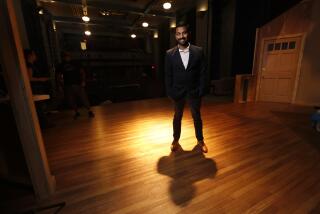Horace Heidt, 85, Dies; Led Big Band of Musical Knights
- Share via
Horace Heidt, whose Musical Knights produced some of the best-known tunes of the Big Band Era and whose alumni became popular entertainers of the distant and recent past, is dead.
His manager, Barbara Jackson, said Tuesday that Heidt died Monday in Barlow Hospital in the Elysian Park area of Los Angeles.
He had been battling pneumonia after suffering a heart attack and undergoing heart bypass surgery in June.
Heidt was among the last and probably the wealthiest of the orchestra leaders of the 1930s and 1940s, displaying an acumen for business that carried over from the disciplined awareness he first established with his often colorful and sometimes wayward musicians. As costs and changing tastes began decimating the big bands, he began to accumulate apartment resort communities in the San Fernando Valley.
Heidt was 85 and lived long enough to see his son, Horace Jr., leading a band fashioned in the image of the organizations the senior Heidt had conducted on America’s bandstands for nearly 40 years.
He became a household word when he was among the first--if not the first--to give away what were then huge sums of money to radio listeners. It was an early and simple radio gimmick. Using names selected at random from telephone directories across the country, operators would call and if anyone answered the phone he or she would automatically win $1,000--even if they were not tuned in to the show.
Frustrated motion picture theater owners--appalled by the number of empty seats they were encountering in the 1930s when Heidt’s “Pot of Gold” aired, pledged $1,000 to anyone who was called while attending their films.
Operators placed three such calls a night while Heidt’s Musical Knights--among them Frank DeVol, Alvino Rey, the King Sisters, Gordon MacRae and Frankie Carle--played and sang popular tunes of the day until a call was answered and announcer Ben Grauer shouted “Hold it, Horace . . . stop the music.”
Although the Federal Communications Commission finally forced the show off the air for being a thinly disguised lottery, the program transformed Heidt from just one of many band leaders into a national figure.
That, however, was many years after Heidt entered the music world--the result of a football injury at the University of California that doomed what he had hoped would be an athletic career.
Heidt was born in Alameda in the Bay Area and his mother was his first artistic influence, purchasing a piano which he loathed. But while recuperating from his football injury (a back fracture) he heard Guy Lombardo on the radio and decided that if he could never again hear the cheering of football crowds he might attract applause from dancers.
He formed his first band and played a series of long-forgotten one-night stands up and down the West Coast, working in real estate and pumping gas to pay his bills between engagements.
Gets Radio Offer
He organized and disbanded several orchestras before getting on the vaudeville circuit. His success there brought a radio offer. That produced “Answers by the Dancers,” in which dancers at the Hotel Drake in Chicago were interviewed between rumbas and fox trots.
Next was “Treasure Chest,” in which married couples celebrating anniversaries would compete for various prizes.
Utilizing his talents as a promoter and businessman, Heidt kept his name in the public eye with a series of personal appearances he billed as a “Youth Opportunity Program.”
Singers and musicians were given an opportunity to perform before live audiences in cities throughout the land, and in the late 1940s--when those expensive road engagements were winding down--staged “Parade of Stars” programs at Hollywood Bowl
Among Heidt’s discoveries were Dick Contino, whom he found when the accordionist was only 18, and comedian Art Carney, whose early show business experience came as a member of the Heidt singing group Donna and the Don Juans.
String of Hits
The band recorded such hits as “I Don’t Want to Set the World on Fire,” “Deep in the Heart of Texas,” “Tippy Tippy Tin,” “The Hut Sut Song,” “Little Sir Echo,” “The Pennsylvania Polka” and “Hi Ho.”
Although much was made of Heidt’s preference for showmanship over sound, his orchestra at times included such famed jazzmen as trumpeter Bobby Hackett and pianist Jess Stacy.
And if he conducted an orchestra in the manner of a stern professor, his business sense provided his band with work at ballrooms and auditoriums at a time when more entertaining leaders were standing in jobless benefit lines. (He even purchased the Trianon Ballroom in Los Angeles to ensure an regular home for his band.)
But gradually, even Heidt’s popularity waned as restaurants and bars began devoting more floor space to diners and drinkers than to dancers.
Heidt saw it coming and by the 1950s began devoting an increasing share of his time to his expanding and lucrative business empire.
Plays at Raider Games
Most of his later years were spent promoting Horace Jr., who leads the band at the Los Angeles Raiders home football games while performing in the evening for a generation of dancers as yet unborn when his father started in 1920 with a five-piece group at the Claremont Hotel in Berkeley.
They were accompanists for a trained dog, Heidt recalled in 1982 at a party celebrating his seventh decade in the music business.
“We would play ‘The Bells of St. Mary’s’ and the dog would ring the bells.”
In addition to Horace Jr., Heidt is survived by two other sons, John and Gerald; a daughter, Hildegarde, four grandchildren and two great-grandchildren.
A funeral service is scheduled at 11 a.m. Saturday at the Hall of Liberty in Forest Lawn Hollywood Hills.
More to Read
The biggest entertainment stories
Get our big stories about Hollywood, film, television, music, arts, culture and more right in your inbox as soon as they publish.
You may occasionally receive promotional content from the Los Angeles Times.










